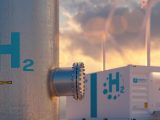
Legislation introduced to develop hydrogen fuel station infrastructure
March 21, 2023Bill supporting the expansion of the H2 fueling network have been reintroduced.
The Hydrogen for Trucks Act is one of four bills in a newly introduced legislation package and would support the demonstration of hydrogen fuel cell vehicles and the development of an H2 fueling station network.
The bipartisan Hydrogen Infrastructure Initiative bill was reintroduced by 2 Senators earlier this month.
 The four-bill Hydrogen Infrastructure Initiative package is in support of the adoption of hydrogen fuel as a clean energy source for powering energy-intensive sectors.
The four-bill Hydrogen Infrastructure Initiative package is in support of the adoption of hydrogen fuel as a clean energy source for powering energy-intensive sectors.
It was reintroduced by Senators Chris Coons (D-Delaware) and John Cornyn (R-Texas). Cosponsors of the bill included Senators Lisa Murkowski (R-Alaska), Bill Cassidy (R-Louisiana), Ben Ray Luján (D-New Mexico), John Hickenlooper (D-Colorado), and Martin Heinrich (D-New Mexico).
The proposed legislation is meant to offer targeted support for using H2 for high-value end-use applications. It will also support refueling infrastructure construction, including transportation, storage and delivery. It is meant to provide support in particular to energy-intensive sectors that are challenging to decarbonize, but where hydrogen fuel could be particularly appropriate as a clean energy alternative.
Hydrogen fuel has considerable potential in trucking, maritime, and heavy industry, among others.
The legislative package is meant to give priority to areas where the result will be the maximum emissions reductions. The point is to bring on the largest possible environmental benefits.

The strategy could reduce the initial cost barriers that stand in the way of those that would otherwise be willing to adopt it. According to the Senators, the package enables partnerships and packages that will help the US to take important steps forward toward meeting the requirements of a strong H2 economy.
The Hydrogen for Trucks Act is, as the name suggests, aimed specifically at the trucking industry. It would support the demonstration of hydrogen fuel cell heavy duty vehicles and of H2 refueling stations. At the same time, it would collect useful data to help direct future H2 trucking infrastructure investments.
Cost barriers for fleet operators would be reduced, clearing the path for early adopters to include fuel cell vehicles in their operations. Data and benchmarks would also become readily available, said the senators, providing an incentive for private investment and boosting demonstration and deployment.
Join in the conversation and help shape the future of hydrogen energy by voting in our poll today – See Below: [forminator_poll id=”57416″]



 With over 15 years of reporting hydrogen news, we are your premier source for the latest updates and insights in hydrogen and renewable energy.
With over 15 years of reporting hydrogen news, we are your premier source for the latest updates and insights in hydrogen and renewable energy.
Finally a move in the right direction. When it comes to setting up the hydrogen infrastructure, all hydrogen is the same — be it green, blue, pink or gray. Why? Because to be of any use, all hydrogen needs to be transported from one place to another.
If I was to show you that a technology is here, which allows for the creation of a POS hydrogen refueling system, and away from a centralized hydrogen monopoly similar to the present petroleum industry. Would that be breaking too many eggs?
This is the year 2023 we should have advanced to better technologies in the energy and transportation sector. Being stuck on toxic fuel having unburned hydrocarbon emitting out carbon monoxide,sulfur, lead nitrous oxide into the air. Moving towards common sense and towards a hydrogen economy and Future using electrolysis with over 2,000 hydroelectric plants can provide enough electricity to make hydrogen for the entire United States for the automotive and the trucking industry building all electric drive trains for vehicles, hydrogen cars essentially are electric cars the only byproduct of using fuel cells is water vapor. Most of hydrogen used in this country is for refining toxic petroleum instead of spending hundreds and hundreds of billions on the war machine and spending billions on oil platforms, polluting our oceans groundwater contamination air pollution. Building a hydrogen infrastructure it makes sense.
For the naysayers out there, consider this: “At [a more than 60 miles] distance, it costs more per energy unit to transport electricity than to carry hydrogen via pipeline.”
And what if I were to say that the technology for POS hydrogen production is here, but greed would rather have it as a centralized and controlled market.
Its about time to move this hydrogen economy to the American public. Other countries are already ahead of us and we should have done this a long time ago. Electric battery is not the answer for everything. I’m glad we are heading in the right direction on this. Hopefully other companies will start investing on this as well…
My first problem is how will you know if the hydrogen is made by green processes or not? Second of all I do not want a hydrogen station within several km from my house. It is highly flammable and will not need much to cause a massive explosion and with fuel station quantities it will be several blocks. Also this stuff needs to be transported in trucks on roads. As an example take the explosion of the natural gas truck in South Africa. Dozens of people killed due to a relative minor accident. I am sorry but I can in no way support such a fuel. Even just for trucks you will need 100’s of liters of the stuff. Imagine an accident on a highway where the fuel tank gets damaged and explodes?
Gasoline is far more dangerous than hydrogen because its explosive vapour can accumulate on the ground, but hydrogen is such a light gas (the lightest of all) that a leak escapes vertically at high speed and does not accumulate. Yes we ultimately need green hydrogen by 2050 but that’s only 27 years away, so the world can’t wait to build up our network of hydrogen filling stations and our hydrogen powered vehicles to meet the deadline, there’s just not enough time, so we need a staged approach with any hydrogen that is fuel cell grade (better than 99.99% pure) now and gradually replace it with blue hydrogen (from fossil methane with CO2 capture) and then green hydrogen by 2050.
As far as the comments made by Johannes Smith goes ,that person seems to forget that petrol is highly flammable. Here in New Zealand we already have a small plant producing hydrogen fuel and some are hoping that Tiwai at Bluff becomes a place for producing a larger amount of hydrogen fuel.
I hope someone in the UK Government reads this great news. We urgently need hydrogen refueling stations in the UK which remains a chicken and egg scenario, with few hydrogen powered vehicles to justify building filling stations, and few vehicles because there are very few filling stations; time to hatch the egg here.